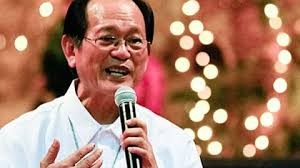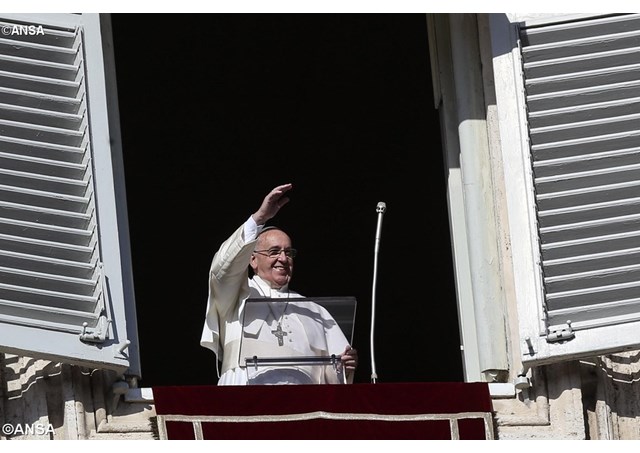Bishop Bacani Still Sharp at 75
by: Abraham de la Torre
THE RENEWAL SEMINAR for lectors, commentators and extrordinary ministers of holy communion held at the Holy Spirit Parish last Saturday drew some 300 participants from the member-parishes of the Holy Spirit vicariate. Ate Au Roque, a familiar face of Fr. Bobot Clemen’s Worship Commission, which coordinates the periodic formation/renewal seminars, was up to her usual task of putting the project in perspective by projecting on the screen the commission’s logo. It had the crucified Christ with the seven sacraments in the background arrayed in their priestly, prophetic, purple royalty. Maximizing the little time she had, she expounded on the sacraments as depicting the different blessings we receive at Mass, where we move and serve. We are one in spirit, with different modalities, commissioned into a mission, with the Eucharist uniting us with Jesus and one another. She likened the activity to PREX, where everybody is encompassed as brothers in Christ, all being of one Father. Then she enjoined the congregation to say to one another, “I’m happy that you are here serving in our beautiful church.” As the mystical body of Christ, she said, we have a responsibility to welcome one another as lay liturgical ministers, for the Eucharist creates the union of one another as church. In baptism, we did not only experience rebirth in and adoption by Christ, we became participative in, not just observing, the process of forgiveness and reconciliation. Having said that, she turned over the microphone to Ate Ime Ileto, who warmed the crowd into rehearsing the songs in the Liturgy of the Hours. Soon, they were dueting in leading the community singing of that day’s Hymn and “Canticle of Zechariah” as the Liturgy commenced.
The guest speaker arrived at the heels of the ceremony and Fr. Bobot, after briefly welcoming the participants, introduced Bishop Emeritus Teodoro Bacani, whose topic was “The Eucharist: Source and Summit of Ecclesial Life.”
His measured gait could fool the unsuspecting spectator. For while his stride was calculated to synchronize with his lean, tall, 75-year-old frame, Bishop Ted’s enthusiasm immediately enveloped the crowd with his initial salvo, a ditty with lyrics repeating “happy” and the pronouns progressing from “me” to “you,” “we” and “all.”
Evidently ethnic, the Bishop from Bataan Tagalized his topic into “bukal at rurok,” for the Eucharist, he said, is every faithful’s depth and height. The Eucharistic sacrifice is made meaningful because the Mass includes communion, the extension and reservation of the blessed sacrament which, once exposed, cannot be severed from the Mass. They are always connected, like Christians and the Church, which is the goal of Christian life on earth and of the whole world of evangelization. The conduct of Mass manifests the church. To illustrate, the Bishop cited a parishioner who, “pag-upo inaantok at pagkolekta e tulog na.” Or those who even sing “I receive the living God” but does it “di mula sa puso kundi sa nguso.” The audience got the joke and responded with a collective coy snicker.
The Bishop made mention of El Shaddai, whom he described as prayer partners even in heavy rain (he later deferred to Soldiers of Christ, another community he serves) and likened them to salt which does not dread melting. Such fealty, he observed, was evident during the visit of Pope John Paul II, who could not forget the Philippines, and then recently, Pope Francis, who was visibly enamored of the Filipinos. Bishop Ted predicted that the spiritual hysteria generated by those two primates can can only be surpassed by another papal visit.
He continued by highlighting the four essences of the Mass: 1. The Eucharist is presence of not only Christ but also of fellow man and friends, the reason why we go to church in our Sunday best, out of respect for God and brethren. So we should not come in shorts, he quipped, “na” short “na sa baba e” short “pa sa taas” and he rehashed the communion joke that had “What a body!” in its context. The crowd’s snicker gathered momentum here. Mass, the Bishop said, starts when the faithful converge, not when the priest makes the sign of the cross or after the collection (or “lagot kayo sa pare,” he interjected); 2. It is the presence of a priest, Christ’s alter ego, and deserves our utmost reverence; 3. He is with us when the word is read. Here, the Bishop commended Quiapo church for having a superb sound system, where equipment and readers collaborate in lovely synch. He insisted that the readings and the homily should both be heard even if “the priest is like a helicopter that hovers and never lands.” He let the laughter ebb before proceeding. Christ is present but are we? he asked. And he made an example of a couple, where the girl looks at the boy but the boy has his eyes on food, and the Bishop alluded to Aldub, who only had eyes for each other, in spite if the legendary strictness of three spinsterish “lolas,” which the crowd lapped up, surprised at and satisfied with his hip wit. Buoyed by his audience’s response, he encouraged them to be, like the center of the celebration, Christ Himself, a dynamic personal presence, “nag-aalab na nag-aalay.” Our ardor should not be like a snatcher’s zeal, who will “magnanakaw at tatakbo” nor of a politician’s, jwho will “tatakbo at magnanakaw.” The crowd roared at this juncture. The Eucharistic prayer is the high point of the Mass and should be given a resounding “Amen,” because, he claimed, even Protestants say Christ’s sacrifice cannot b repeated. Communion, he added, is union with Christ; 4. At the final blessing, when the priest sends off the congregation with “Sumainyo ang Panginoon,” blesses them in the name of the Father, Son and Holy Spirit, and lets them go in peace, they have been blessed and should take the blessing with them to share with others. He urged them to go not to the blessed sacrament because they have just been there but to their neighbors, especially those who have no one and to whom no one goes, and share the blessings with them.
He recalled Cardinal Chito Tagle lamenting the fact that money is recently separating love among families in cases where the husband goes abroad, becomes Mr. Lonely, seeks out company and finds Mrs. Lonely. Or it could also be a case of the family that facebooks together no longer prays or goes to Mass together. The advent of technology usurping what little values are left of the modern-day Nazareth.
The open forum that followed was interesting as it further propelled the Bishop’s sharpness.
Q. Why is there no longer an “Amen” after the “Our Father?”
A. Because the prayer does not end but extends or expands.
Q. Why is it allowed in other churches for lectors/commentators to serve more than once?
A. If there are only a few servers, there is nothing wrong. It is ideal, however, if service were distributed, and facilitation, not substitution, is effected. More should be stimulated in joining the ministry.
Q. (Noting the Bishop’s age and ability as a prod) Should the elderly be discouraged from serving?
A. Elderly or senior citizens who sre still able to serve should not be discouraged. If there are guidelines to be observed, they should be flexible in accordance with ability, human consideration and respect for the elderly.
Q. Are we supposed to lift our hands, or hold the other’s, when we pray the “Our Father?”
A. Lifting of hands is adoring God and is an acceptable gesture. If you must hold hands, make it natural and, according to Fr. Gerry Diwa, symbolic of unity.









